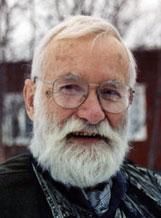 |
| Dr. Walter J. Freeman |
- Walter J. Freeman
On a sunny Tuesday morning when most of the University of California, Berkeley student body was away from campus for Spring Break, Selene and I had the pleasure of visiting Dr. Walter Freeman in his Donner Lab office. He provided us with a simple introduction to neurodynamics -- brain waves are a "special kind of noise," he explained -- before expounding on the theoretical outgrowth of his neuroscience research. Many of Walter's conclusions about the workings of the brain have an unexpected antecedent, the philosophy of the 13th century theologian, St. Thomas of Aquinas (Walter prefers the Italian formulation, Tommaso, so I will use it here).
Thomism, Tommaso's philosophy, postulates that individual choice is foundational to the action and development of the mind. Although Walter was quick to point out that "free will" is something of a misnomer -- since all choices are constrained by reality and informed by multitudinous factors -- he explained that Thomism posits that the mind is supplied with information through observation and that the individual then takes action based on the information received. In Tommaso's lexicon, we derive such information from the "phantasm," an external sensory stimulus. How the received information is processed and acted upon, however, varies widely. Tommaso writes that "the received is in the receiver according to the mode of the receiver." Whatever action results, that very act supplies new information to the brain (through observation and experience), and the brain accommodates accordingly.
Wikipedia helpfully informed me that "Thomas's epistemological theory would later be classified as empiricism, for holding that sensations are a necessary step in acquiring knowledge, and that deductions cannot be made from pure reason." This element of the irrational becomes especially important when we move away from more routine mentation. What happens when life only gives you lemons...really dreadful lemons? Then, Walter says, it must be "creativity all the way." Unpredictable and extreme situations give rise to a different kind of accommodation.
As an example, Walter told us about a curious, last-ditch evasion technique employed by some moth species when pursued by a bat. If a moth's primary and secondary evasion strategies, adaptations and behaviors intended to allow the moth to avoid sonar detection altogether, fail and the insect realizes a bat is "locked on" for the kill, the moth will fold its wings and tumble from the sky. How well does this surprising maneuver work? Walter couldn't say (and, frustratingly, I haven't been able to hunt down data online), but the technique's efficacy is less interesting to Walter than the moth brain's creative solution. The brain is accommodating itself to an untenable situation not by giving up, but by trying something unexpected, unpredictable.
And so it is with all brains; chaos in that organ endows us with the ability to respond flexibly to the outside world and to generate novel ideas…whether when running from a tiger or painting a picture. As part of BAASICS.3: The Deep End, Walter will present "Persevere or perseverate? How brain chaos surmounts our daily challenges."
Image credit: photo ripped from Machines Like Us website

2 comments:
If I was in SF I would be going to this in a heartbeat. Wonderful to read your posts again!
Thank you, Tamsen!
Post a Comment